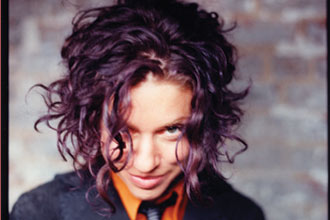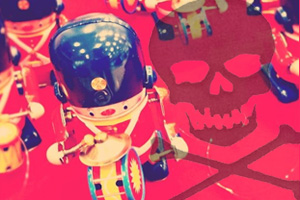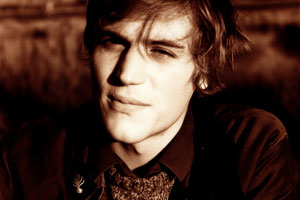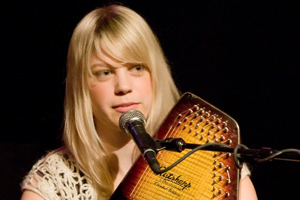
Courtesy Ani DiFranco
My first interview with Ani DiFranco was back in 1995 and ran in the debut issue of Monkey Magnet, a little music zine I’d started as a side project down in Santa Cruz, California—which says something about her. It wasn’t like DiFranco needed small-time publicity. She was a fast-rising star, shaking up the folk circuit with her aggressive fingerpicking and smart, in-your-face feminism; this was during the Not a Pretty Girl period, and her press kit was overflowing with lengthy clips from the New York Times, Ms., Interview, Guitar Player, and more. She was selling hundreds of thousands of albums (her own) on an indie label called Righteous Babe (also her own) launched some five years earlier. Onstage, she was a hip badass—a funny, tough, sexy character with clever lyrics who completely owned the stage. Alternately assaulting and milking sweetness out of her acoustic guitar, she captivated her audiences—as far as I could tell, everyone in the halls, regardless of gender, was smitten.
By 1999, when I spoke with her again on behalf of Mother Jones, she’d graduated from playing 500-person halls to venues that held thousands—and was beginning to branch out, collaborating with the late labor organizer/storyteller Utah Phillips. She continued pumping out albums and touring relentlessly until a few years ago, when she slowed things down a bit—kind of necessary when you have a baby to raise. But DiFranco is getting back into it in earnest, working on material for a new CD. Besides her 20 albums to date, Righteous Babe now offers releases from more than a dozen other artists. Recently, I asked her to name a few of her own favorite things to listen to—and just for fun, I’ve included some vintage exchanges from that very first interview.
Mother Jones: What’s your favorite new or upcoming release?
Ani DiFranco: Animal Prufock’s new album Congratulations, Thank You + I’m Sorry on Righteous Babe. Animal is formerly one-half of the duo Bitch and Animal, and this is her first solo release since then. The album is just chock full of cool songs with a political backbone and an indie edge, and I had a blast working on it with her.
MJ: So, what’s your favorite politically themed song or album of all time?
AD: I mean, there are too many great ones to pick. But for the purpose of this interview how bout “Deportee,” by Woody Guthrie.
MJ: Favorite new release outside your genre?
AD: I don’t know about genres, but I’ve really been enjoying a record called Run Wolves Run by a fella named Sean Hayes. Sean opened for me at a couple of dates out in California, and I’ve been enjoying his album as much as I did his live show.
MJ: Shuffle your iPod (or equivalent) and name the first five songs that pop up. (The truth, now!)
AD: I don’t have an iPod (the truth now!) or equivalent.
MJ: Okay, well what’s the latest song, good or bad, that super-glued itself in your brain?
AD: Sean Hayes, “Someday The River”
MJ: Three records you never get sick of listening to?
AD: Hank Williams, five-disc set
Pete Seeger, another five-disc set
Jon Hassel, Fascinoma
MJ: Any guilty pleasures—stuff you like to listen to but don’t like to admit it?
AD: I seriously hate pop music and all things super-commercial, so I’d be hard pressed to feel embarrassed by anything I listen to. Besides, I have a three-year-old, so I don’t have time for guilty pleasures anyway!
MJ: And as the mother of a three-year-old, what kids’ music do you find most tolerable? Have you composed anything especially for your daughter?
AD: Schoolhouse Rock (which I remember from my childhood) does indeed rock. Other than that, she pretty much listens to the same music we do. She loves the Jackson 5 and squeals along with James Brown. She also loves “the mommy music” and requests my records a lot, but I haven’t written any kids’ music yet.
MJ: You’ve broken molds both as a singer/songwriter and as a businesswoman. Any up-and-coming women singer/songwriters you see doing something truly original?
AD: Well sure. I love Regina Spektor and Anais Mitchell. Also Joanna Newsom. There are many great young writer/players out there of all makes and models. I’m sure I don’t even know the half of them!
MJ: If you could collaborate with any one of your musical heroes, dead or alive, whom would you choose and why?
AD: I’ve asked both Pete Seeger and Willie Nelson to play on this new record I’ve been working on. We’ll see if it actually happens!
And now, let’s rewind back to 1995, and speak with a younger Ani DiFranco…
Monkey Magnet zine: Was your family musical? There was a singing DiFranco family on television at one time—any relation?
AD: [Laughs.] No! I’ve heard of ’em. That wasn’t my family.
MM: Has your family been supportive of your music?
AD: Well… Yeeeeaah. I mean, I don’t know: I’ve never had a very closely connected family. My parents split up when I was young and I was living with my mom for a little while, then I was kind of just on my own really young. It wasn’t some kind of global tragedy, it was just never really a very close-knit family. So there was support in the sense that they didn’t stand in my way.
MM: Is there any difference between the Ani we see on stage and the private Ani?
AD: No, not really. I’m not one of those people who has an act. I don’t have a schtick. Performing is kind of weird—I mean the whole scenario is kind of fucked, but I try to make it as normal as possible given the fact that I’m up on a platform and you’re in the dark. [Laughs.] It’s that kind of evening out, that topography, trying to make the stage and the non-stage kind of the same place. It’s kind of a challenge.
MM: Especially when you’re playing a big hall.
AD: Yeah. It gets harder and harder to make it real, the more imbalanced it becomes.
MM: Did you ever play with a full band?
AD: When I was 16, I played in a band. We didn’t really have a name. We were kind of a house band at the Essex Street Pub. It’s a place that holds like 20 people and it’s in a nowhere neighborhood in Buffalo. I was the songwriter; I was like “suck girl.”
MM: Do you ever play any of those old songs?
AD: Oh no! I don’t remember them.
MM: How much time would you say you have off a year?
AD: Not much.
MM: So you’re basically touring all the time. Does that make it hard to maintain close friendships?
AD: Yeah, it does. I mean, there’s a lot of people that I touch base with all over. But then again I don’t have the opportunity to spend much time with any of them.
MM: Is that a drag for you?
AD: Well, yeah. It is kind of lonely. I mean, I like my job. It’s just one of those sacrifices you make. It’s like: relationships, relation-shmipps! [Laughs.]
MM: Let’s talk about fame a minute. It’s getting to the point where you’re getting to be really well known. How’s that changed your life? Has it been a drag, or cool, or both? And is it harder to make friends when everybody knows who you are?
AD: Well. It’s a bit of a drag to not… I mean, you’d never know it from the job I have, but I don’t really like to be the center of attention! [Laughter.]
MM: Oh, come on!
AD: [Still laughing.] I mean, I know you won’t even believe it, but it’s just not my thing. I’m bad at parties. I’m the person who like, everybody turns around a couple hours later and are like, where’s Ani? I’m like 20 blocks away. I’ve just kind of left. I dunno. I’m a little hibernating animal. Anonymity is one of my favorite things. I mean, that’s why I moved to New York when I was like 18, because there, there are just so many people that there’s no one and you’re just lost. You’re completely invisible and I find that very liberating. I think I’m a very solitary person. To actually not be anonymous is a bit claustrophobic for me. I was just in New York yesterday walking around all my haunts, you know, and people were cool, but people were coming up saying things and wanting to say hi and I was thinking, “Wow…”
MM: Like, can’t I just be alone?
AD: Yeah.
MM: Speaking of anonymity, you sort of reinvent yourself every tour, image-wise, like the old David Bowie or Madonna type of thing.
AD: Yes, I’m always in disguise, and it’s not just from the rest of the world. Partially, it’s because I always try and stay one step ahead of people, not looking like I looked like last week, so I can be as anonymous as possible and part of it is just for me. It is fun to just come up with new and bizarre colors for each area of your body and things like that, but there are some parts of it that I just keep wanting to negate myself. I hate waking up in the morning and recognizing the woman in the bathroom mirror.
MM: Oh my God! It’s Ani Difranco! Aaaaagh!
AD: [Laughs.] Yeah, it’s like, Oh, get her away! I want to see somebody new all of the time.
MM: What’s up with the press-on nails and electrical tape?
AD: The way I play guitar is very, very hard and I bloody myself incredibly without the tape. And the nails are my picks.
MM: Do they work well?
AD: They do, but there’s only one brand that’s really, really thick.
MM: And the name of that brand is…?
AD: Maylene.
MM: There’s a $500 check in the mail!
AD: [Laughs.] I’m a spokeswoman now.
MM: People call you folk-punk. Where does the punk come in for you. Do you like punk rock or do you have your own definition of punk?
AD: Well, I see a lot of connections between folk and punk music just because they’re both subcorporate music—I mean, traditionally. So for me it’s much more economic and political, those kind of descriptions. I mean, my music doesn’t really sound like punk music, it’s acoustic right? And it doesn’t really sound like folk music ’cause, I don’t know, I’m thrashing too hard and emoting a little too much for the sort of introspective, respectful, sort-of folk genre thing. I’m really into punk and folk as music that comes out of communities and is very genuine and very immediate and not commercial—well until recently. Now punk is the next commercial wave, so maybe I’ll just have to amend my little spiel.
MM: There’s a lot of hypocrisy in the punk scene.
AD: Yeah, well. People are young and they get sold on a lot of things and they get starry-eyed or whatever. You know. Everything changes.
MM: Have you faced that, the temptation, the starry-eyedness?
AD: I guess I face it all the time in that I have to wake up every morning and do my job, and a lot of mornings I just think, “Why? Why don’t I just sign a record deal? Fame and fortune, what’s wrong with that? So every day I have to make the decision that there is something wrong with it.
MM: Is that a hard decision for you?
AD: Sometimes. I mean, less and less, because things are looking up for me. But I have a lot of friends who are musicians and a lot of them sign record deals along the way with indie labels and major labels and people come from behind and zoom right past me all the time. I mean, it’s taken me so many years to get to here and, you know, things could have been very accelerated and life could be very glamorous and cushy right about now. But I sort of chose a different path and I have to be happy where I am and not be resentful of everybody who just sold right out and have all these things I don’t have. Ultimately, that is not what I want. I want other things.
MM: Tell us about Righteous Babe. What were the biggest obstacles to doing things on your own?
AD: Well, there’s so many. Maybe if you could be more specific.
MM: To get people to take you seriously as your own label, to get good distribution; I mean, how long does it take to really get your stuff out there?
AD: Years and years and years. It takes so much patience. People who are just starting out are always sort of coming to me for advice as the example of “independent girl,” and lots of people ask, well, how did you get the booking agent or the national distribution or the tours? And I look at them like, “Good lord! Relax!” I mean, how I did it was to not care about it and to not even think about it for years and years. All I thought about was getting the next little gig in the little bar, and I get this sense that people want me to give them the secret formula or the magic trick to make it all happen. I think low expectations are really useful, and a lot of patience. And being independent, because you don’t have any leverage in the music industry, you give everybody an opportunity to dismiss you because there’s no recourse. They don’t have to take you seriously because your album doesn’t have the Warner Bros. stamp on it and “Jack” from the A&R office isn’t taking you to lunch. You’re not part of the club and they can just ignore you, and it happens a lot. But what I like about being independent is that anybody who does play the album on the radio and anybody who does choose to write in the media does so because they want to, because they like it or because they find something interesting there, not because they have to.
MM: The last time you came to play around here, I remember you had just gotten your first negative review and you were pretty bummed about it. What are your experiences with the media. Is criticism hard for you?
AD: Yeah. That’s another thing people find hard to believe because they think I’m very tough, very strident, that I tell everybody where to get off, and how. [Laughs.] But I’ve actually got a really thin skin. I don’t know. It’s quite pathetic. So, yeah, it’s hard for me to take criticism. But I also kind of have this sense of humor on overdrive, so I don’t take any of it seriously. So that sort of saves me, the fact that I think it’s just all kind of funny.
MM: Let’s shift gears. What do you like to listen to?
AD: Oh, everything. I mean I’m one of those people, if you look at my music collection it’s like folk and roots and world music and beat, ambient, death, sex music and rap and hip-hop and thrash and punk. You know, it’s just…whatever.
MM: Sounds like our house. So who would you tour with if you could tour with anybody? Any musicians you idolize?
AD: Yeeaaah. I’d tour with Tom Waits, I think.
MM: Who else? Queen Latifah? Liz Phair? Annie Lennox?
AD: [Laughs.] Salt n’ Peppa!
MM: What do you do when you’re not playing?
AD: There’s no such thing. Either I’m on tour or I’m at home working on an album. I don’t really take a lot of time off.
MM: So you’re a workaholic.
AD: Pretty much, but when you’re doing what you love it’s hard to think of a reason to stop.
MM: Do you think of it as work?
AD: Well, yes. It’s very hard work, but it also keeps me going…. You know, I have to get off the phone, because I have another interview. Sorry.
MM: What-ever! [Laughter.]
Click here for more Music Monday features from Mother Jones.














